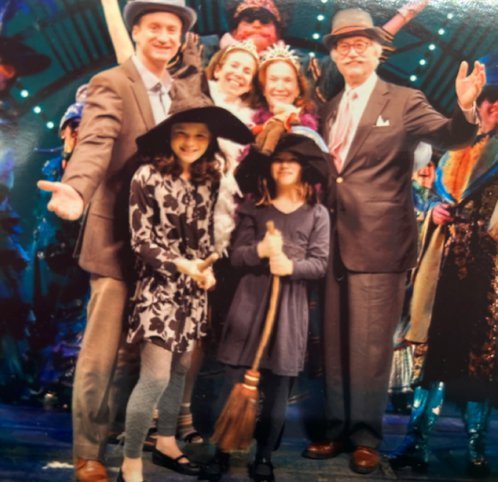Film Review: Wicked Part One: The Personal is the Political
With gratitude to Dr. Bettie Bassett-Roundtree, social work mentor and inspiration.
Image Credit: 2024 Universal Pictures
by SaraKay Smullens, MSW, LCSW, DCSW, CGP, CFLE, BCD
Dr. Bettie Bassett-Roundtree
As we approached Thanksgiving and the holiday season, many—perhaps most—in our proud, historic profession struggled with the toll of societal burnout, the simmering anger and divisions in our country, our world, also reflected within our profession. My sadness was intensified by the imminent death of an extraordinary mentor and irreplaceable friend, Dr. Bettie Bassett-Roundtree, who entered my life when I transferred to the University of Pennsylvania School of Social Work (now the School of Social Policy and Practice). In all academic and supervisory contacts, Dr. Bassett-Roundtree’s underlying message was hand in glove with the moral insights of our profession: all human beings long for love, opportunity to meet basic needs, freedom of expression. All of humanity have far more in common than what divides us, and personal developmental opportunities determine our ability to grow to maturity and create and protect institutions devoted to this process.
I entered the movie theater on the Tuesday evening before Thanksgiving, never expecting part one of the film Wicked (part two is expected in a year) to offer the truths and depth reflected in the 2003 Broadway production. But I was wrong, very wrong. The message of this extraordinary film not only mirrors the truths seen on stage. It illuminates the foundation of social work principles—the insights, awareness, and direction the social work relationship can offer those we are privileged to work with, whatever our concentration.
The evolution of the books, stage, and film expressions of The Wizard of Oz is long and complex, but as capsule comment, most know the Dorothy (Judy Garland) 1939 rendition, adapted from the 1900 children’s novel, The Wonderful Wizard of Oz, by L. Frank Baum. The film’s (and Baum’s) golden messages: to succeed in life, you must follow the path (the yellow brick road) to intelligence (the Scarecrow), guts (the Lion), and heart (the Tin Man). Wicked witches can and must be destroyed, and above all, there’s no place like home.
While the classic The Wizard of Oz is mesmerizing, it is also simplistic, skirting cruel, destructive realities. Many homes are not safe, they are tortuous; those who express hate have known its poison in formative years; sociopaths who rise to power yearn to destroy freedoms and dominate all societal attempts to provide them. Further, there is no one true “yellow brick road” to follow. We are each unique. Our individual “emotional sense of direction” helps us move toward fulfillment, learning from and strengthened by inevitable jolts that lead to altered paths.
Enter the musical Wicked (2003), based on Gregory Maguire’s 1995 novel, Wicked: The Life and Times of the Wicked Witch of the West. Dorothy and illusion are gone, replaced by reality. The supposedly wicked witch is an innocent, rejected, tormented child, now scapegoated as evil by those who fear her moral force and vision. We see there are those who paint themselves as loving, who are anything but. We see that life is not only unfair; it can be ruthlessly unjust.
Directed by John M. Chu, known for his full scale, over-the-top films where talent thrives (Crazy Rich Asians and In the Heights), Chu does not disappoint in his rendering of truth. His ensemble casting is seamless. The expansive choreography, scores and music, and the voices and dance that give them life offer enchantment, extended to set designs and costuming, be they in Munchkinland, Emerald City, or the campus of Shiz University, where the film opens. This genius bonding keeps us glued to screen drama, despite its length. One hundred sixty minutes seem to fly by.
Not surprisingly, Chu’s Wicked gifts audiences with two magnificent leads. We are riveted by Elphaba, played by the Emmy, Grammy, and Tony winning talent extraordinaire, Cynthia Erivo (Harriet, The Color Purple). Hated by her father, a traveling salesman as well as corrupt governor of Munchkinland, and rejected by her floozy mom who conceived her during a one-night (or perhaps two, or three) stand. To her parents, Elphaba is living proof of their curse: her skin is green. As with our clients determined, often against great odds, to rise above brutal rejection, we are with Elphaba, rooting for her, as she begins to discover her power, face her shame, and discover why her skin matches Emerald City.
Audiences are also riveted by the delightful presence of Ariana Grande-Butera, a Grammy winning, multi-platinum superstar, who plays the adorably flirtatious, slightly awkward, narcissistic Galinda, later Glinda the Good, a living example of the impairment of overprotection and overindulgence. Molded by over-the-top privilege and fierce ambition, we watch Glinda begin to discover the importance and power of love and authentic connection. Even the Prince she yearns for, played by the multi-talented Jonathan Bailey (Bridgerton), becomes captivated by Elphaba’s depth of conscience and decency.
Development of the relationship between Elphaba and Glinda, who start out as enemies but become devoted friends, caring deeply for the well being of the other, underscores the message of the film: Despite all, love must be protected. Personal, individual developmental opportunities mold this capacity to care beyond ourselves, while corrupt leadership, in our homes, our work settings, and beyond destroy it. To quote Bettie Bassett-Roundtree, the Personal is the Political. At a time when desperately needed, the blended genius that created Wicked: Part One offers the magnificent beauty of hope.
Read the full review on socialworker.com
SaraKay with family during Wicked intermission, Broadway production (2011)


